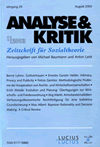Suchergebnisse
"Andrew Walton"
Titel: Fraternal Society in Rawls’ Property-Owning Democracy
Autor: Andrew Walton / Valeria Camia
Seite: 163-186
Abstract: This paper discusses what type of sociological context is appropriate for Rawls’ ’property-owning democracy’. Following certain suggestions offered by Rawls and in the work of Joshua Cohen, it explores, in particular, the kind of fraternity and social interaction suitable for citizens in Rawlsian society and the role of the state in engineering these bonds. Utilising a normative framework based on Rawls’ discussion of a property-owning democracy and various data sets, the paper argues that bonds of social trust, active participation in trade unions and enrolment in public schools, and the use of state policy to organise a mixture of public, cooperative, and private economic institutions would be suitable for a Rawlsian society to adopt because it appears that these structures are favourably connected to the ends of Rawlsian justice.
Titel: Comment on Andrew Walton
Autor: Carina Fourie
Seite: 187-192
The Basic Structure Objection and the Institutions of a Property-Owning Democracy
Abstract: Andrew Walton argues that a Rawlsian property-owning democracy (POD) requires a fraternal ethos and certain forms of social interaction, such as high trade union membership. The basic structure objection could be used to challenge these claims as it indicates that Rawls’s principles of justice should only be applied to the basic structure of society, and not, for example, to an ethos. Walton has two responses to the objection: firstly, that it does not apply to his argument, and, secondly, even if it were to apply, the objection itself is unconvincing. In this article I argue however that (1) the basic structure objection does apply as a fraternal ethos is difficult to reconcile with Rawls’s understanding of what should be included as part of the basis structure, and (2) although I do not defend the basic structure objection, it is not made explicit in Walton’s argument why the objection should be dismissed as unconvincing.

Property-Owning Democracy
2013 (35) Heft 1
Guest-Editors: Francis Cheneval / Christoph Laszlo
Editorial
In recent years, ’property-owning democracy’ (POD), defined by widespread ownership of productive assets, has become one of the key-factors in the assessment of the institutional design implied in John Rawls’s theory of justice. The wider implications of this inquiry also engage scholars who do not subscribe to Rawls’s conception of justice but are broadly interested in normative questions of political economy and the basic structure of a just polity. In the course of this debate, the in...